Balance of our body is controlled through signals going to the brain from:
- The eyes
- The inner ear (vestibular system)
- The sensory systems of the body (such as the skin, muscles, and joints).
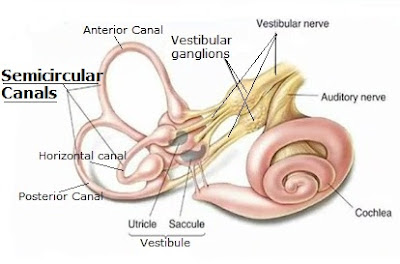
These signals keep brain always alert to the body position according to the gravity and the brain keeps always the body in balanced position preventing falling.
Any damage to these organs or to the neural pathways between them and the brain or the brain itself will cause dizziness or vertigo.
So the ear isn’t just hearing organ. It is a complex system of parts that not only allows humans to hear, but also makes it possible for humans to keep their balance. The vestibular system in the inner ear consists of three semicircular canals which are oriented in three different planes, utricle and saccule. They are filled with fluid that moves in accordance with the body’s movements and sends signals with neural pathways (vestibular nerve) to the brain.
When do you need to do balance tests?
If you feel:
Dizziness: experience of light-headedness or a sensation of losing your balance, or a sense of feeling unsteady.
Vertigo: type of dizziness in which there is a sense of movement or spinning. Changing position can make it seem worse. Nausea and vomiting may accompany the vertigo.
Hearing loss
Tinnitus
And If you have plus to the dizziness any of the following other symptoms, be sure to seek emergency medical care:
- Chest pains

- Numbness or tingling
- Falling or problems walking
- Weakness in the legs or arms
- Blurred vision
- Slurred speech
- Sudden hearing loss
- Severe neck stiffness
- Head trauma or injury
- High fever
Why do you need balance tests?
Balance tests determine:
- What is the cause of the problem?
- Where in the balance system is the problem?
- What are the changes that happened in the balance system? Are they temporary or permanent?
This information will help the doctor to find the diagnosis and to choose the proper management plan.
What are the balance tests?
Bedside balance tests: They are mainly done by observing your eyes in different head and body positions. The most important finding which the doctor will be looking for is nystagmus (special kind of involuntary eye movements which helps the doctor to differentiate between different causes of vertigo or dizziness).
If bedside balance tests will not be enough to find the problem, she will ask more detailed balance tests that need special equipment as.
- Videonystamography VNG ( Spontaneous Nystagmus , positional Nystagmus , caloric test, Dix Hallpike, Ocular motility tests)
- Video Head Impulse Test VHIT
- Cervical or Ocular Vestibular Evoked Myogenic potentials cVEMP and oVEMP
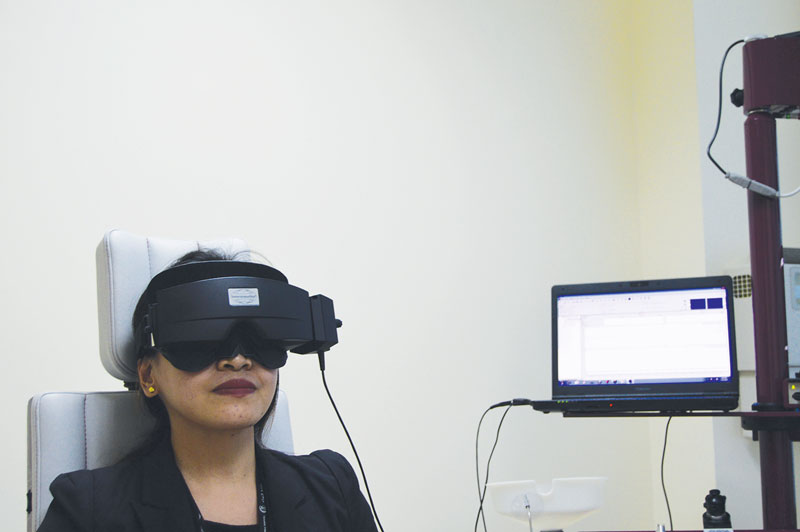
VHIT, VNG is done with a google fixed firmly over your eyes, tracking and recording your eye movements with camera as you look back and forth between designated points and move your head and body into different positions.
A final portion of the test involves the insertion of cool and warm water into your ear to determine if the vestibular system is responding normally to temperature stimulation.
cVEMP and oVEMP are done by putting electrodes on the neck , around the eyes and recording muscles activity as response to loud sounds.
Important Instructions for VNG Testing
For most accurate VNG results, it is important to:
- Avoid certain medications for 48 hours before the test, including sleeping pills, diuretics, tranquilizers, sedatives, antihistamines, muscle relaxants, anti-dizziness medications, barbiturates, anti-depressants, anti-anxiety medications, and pain medication.
**Please do not discontinue to take your medications without checking with the physician who prescribed them. If you cannot go without a medication listed above, please inform your doctor - Avoid alcohol consumption for 48 hours before the test.
- No food or beverages (except water) for 4 hours before the test.
- No smoking for 3 hours before the test.
- No eye makeup (eyeliner or mascara, especially) should be worn to the test.
- Please dress comfortably to facilitate the physical movement portion of the test. Women may wish to wear comfortable pants.
The caloric test will likely cause some dizziness, this is critical for measuring your physiological response to the symptom. This generally passes within a few minutes. It’s a good idea to make arrangements for someone to drive you home in the unlikely event of prolonged dizziness. Expect your test to take approximately 60–90 minutes.
Most common diseases causing vertigo or dizziness
BPPV
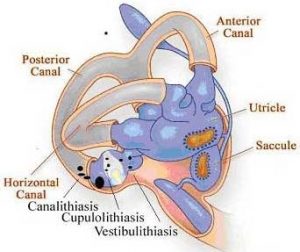
The most common cause of vertigo seen in ENT clinics is benign paroxysmal positional vertigo, or BPPV. Spinning vertigo lasts for seconds to minutes. It is not constant might occur whenever tipping the head up or down, lying down, or turning over or sitting up in bed. Sometimes the vertigo will be severe and will accompany with nausea and vomiting. The patient doesn’t experience any hearing loss or ear pressure or ringing sounds in the ear.
Why BPPV Happens?
The balance system in the inner ear consists of three semicircular canals which are oriented in three different planes, utricle and saccule. They are filled with fluid that moves in accordance with the body’s movements and sends little impulses with neural pathways to the brain. The brain then decodes these impulses and helps the body to keep its balance according to the gravity. The ear has small crystals called “otoconia” which is normally located in the utricle. For some reason these crystals will come loose and dislodged from its place and will fall in one of the semicircular canals moving freely in the fluid with special head positions causing spinning sensation whenever the head is in that position.
How is BPPV Diagnosed?
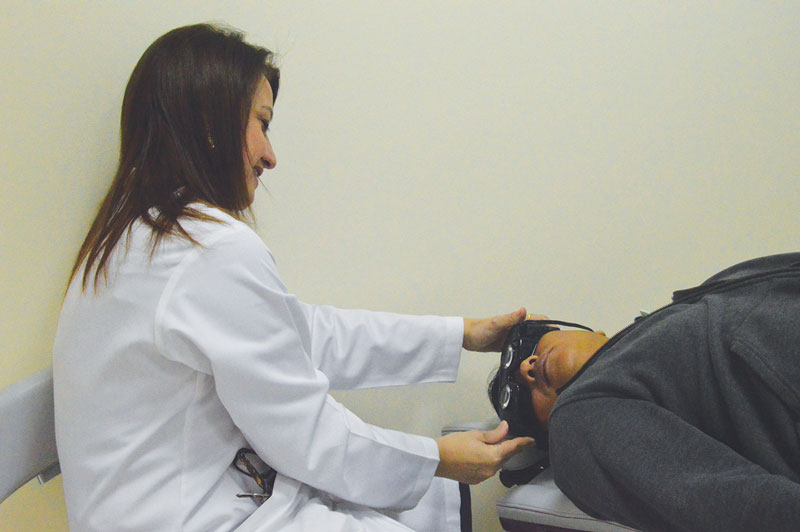
The diagnosis is based on history and findings on physical examination. The doctor might do several bedside balance tests which are mainly done by observing your eyes in different head and body positions. The most important finding which the doctor will be looking for is nystagmus (special kind of involuntary eye movements which helps the doctor to differentiate different causes of vertigo or dizziness. It is important for the doctor to decide which ear is affected and which canal is affected to choose the proper repositioning maneuver for treatment.
These tests can be done without recording or with recording with VNG.
How is BPPV treated?
BPPV is easily treated in the office by repositioning maneuvers. The aim of these maneuvers is to make the crystals fall back into its place by putting the head in different positions. Each canal involvement has specific maneuver( Eupley, Semont, Barbeque maneuvers and esc…) The doctor has to decide according to your exam result which ear and which canal has to be treated.
1. Meniere’s disease
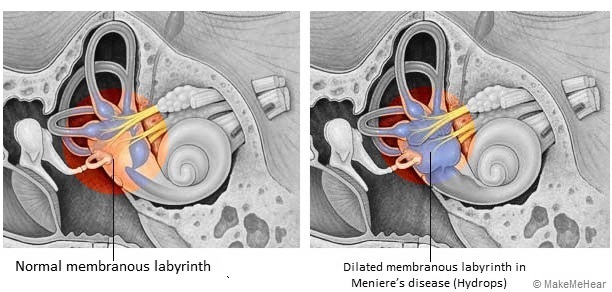
One of inner ear disorders which presents as recurrent attacks of spontaneous vertigo that last for minutes to hours accompanied by sensation of pressure or fullness in the ear and ringing in the ear. This can cause intermittent hearing loss only when having the attacks or gradual worsening of hearing or sudden hearing loss which is permanent.
An acute attack of Meniere’s disease is generally believed to result from increasing pressure of the fluid within the inner ear. This is called “hydrops”. One way for this to happen is when the drainage system, called the endolymphatic duct or sac is blocked or too much fluid secreted by the stria vascularis. In some cases, the endolymphatic duct may be obstructed by scar tissue, or may be narrow from birth.
It is diagnosed by hearing and balance tests.
At the present time there is no cure for Meniere’s disease, but there are ways to manage the condition and to control the symptoms.
Self-Care and Home Treatment
- Diet and change of life style
Changing your diet may help to reduce the amount of fluid in the inner ear and ease symptoms. Items to limit or exclude from your diet include:
- salt
- caffeine
- chocolate
- alcohol
- monosodium glutamate (MSG)

It’s also important to drink six to eight glasses of water per day, so your body isn’t retaining fluid. Other lifestyle remedies include:
- resting during vertigo attacks
- eating regularly (to help regulate fluids in your body)
- managing anxiety and stress through psychotherapy or medication
It’s also important to quit smoking; nicotine can make the symptoms of Meniere’s disease worse.
Even though there’s no cure for Meniere’s disease, there are strategies you might want to consider to reduce your symptoms. Talk to your doctor about treatments that can help you cope with Meniere’s disease which may be.
- Medication
- Intratympanic injections
- Surgical treatment
Intratympanic Injections
Intratympanic injections can be used to treat Meniere’s disease. This means they are injected into the middle ear, through the ear drum. A procedure performed in the office.
This treatment is occasionally considered for patients with vertigo attacks not controlled by other medications and therapies.
Procedure
The injections are performed with the patient lying down and using the office microscope. The ear is first cleaned of wax. A small area of the eardrum is numbed with a drop of medication. A small needle and syringe are then used and the needle is passed through the eardrum at the site that is numbed so that the tip is in the ear, near the round window. This is a membrane where drugs are absorbed in to the cochlea. The fluid is injected in to the middle ear and the patient stays lying down for 20-30 minutes during which he does not swallow or sniff. The drug sits against the round window and is absorbed in to the inner ear. The patient then sits up slowly and leaves the office. Patients should not drive for a few hours after this procedure. Water is kept out of the ear until it is confirmed that the tiny hole has healed.
In some patients, a ventilation tube is placed in to the eardrum and the medication is injected through the tube. This can allow the patient to self-treat with drops at home
Complications
- A hole in the eardrum – This is a rare complication and it is higher when a ventilation tube is placed. The holes are usually small and can usually be repaired in the office.
- Dizziness – This is usually short lived.
- Loss of hearing – Depending on the particular therapies. In most cases are very rare.
- Infection -This is rare.
2. Acoustic Neuroma 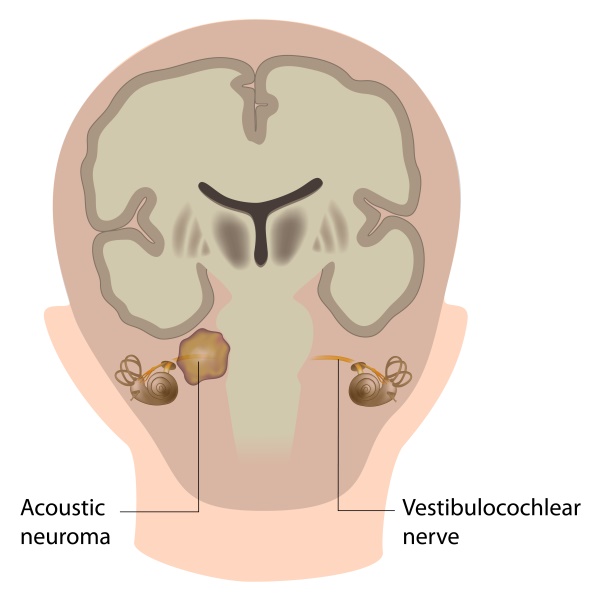
Benign slow growing mass that occasionally occurs on the hearing and balance nerve. It presents with hearing loss and tinnitus (sounds in the ear) in one side. Any patient with an unexplained progressive hearing loss and ringing sound only in one ear should get a MRI to rule out the tumor. Most commonly, an acoustic tumor is treated with surgery or radiation to prevent complications caused with ongoing tumor growth.
Vestibular Neuritis VN
Vestibular neuritis is a disorder that affects the balance nerve which is called vestibular nerve. This nerve transfers body and head position information from the inner ear to the brain. When this nerve becomes swollen (inflamed), it will cause vertigo and imbalance.
The most likely cause for inflammation as recent researches is viral infection of the nerve.
What are the Symptoms?
- Constant Vertigo that develops over seconds , minutes , hours and lasts more than 24 hours
- nausea and vomiting ,
- head motion intolerance
How is VN Diagnosed?
The diagnosis is based on history and findings on physical examination. The doctor might do several bedside balance tests which are mainly done by observing your eyes in different head and body positions. The most important finding which the doctor will be looking for is nystagmus (special kind of involuntary eye movements which helps the doctor to differentiate between different causes of vertigo or dizziness.
These tests can be done without recording or with recording.
How is VN treated?
In acute stage of the disease the aim of the treatment will be to reduce acute symptoms (vertigo, nausea, vomiting) and If these symptoms are severe and not able to be controlled by oral medication patients may be admitted to the hospital for IV medication and fluids to prevent dehydration.
We do not recommend long-term usage of central vestibular suppressants because they may make recovery more difficult by preventing brain compensation.
If balance and dizziness problems last longer than a few weeks, a vestibular physical therapy (vestibular rehabilitation program) may be recommended. The goal of this program is to help the brain to compensate and adapt the body to the changes which happened in balance system.
Can vestibular neuritis recur?
In most patients (95% and greater) vestibular neuritis is a one-time experience. Most patients fully recover.


 (4 votes, average: 4.25 out of 5)
(4 votes, average: 4.25 out of 5)